Les écrivains allemands et la Grande Guerre
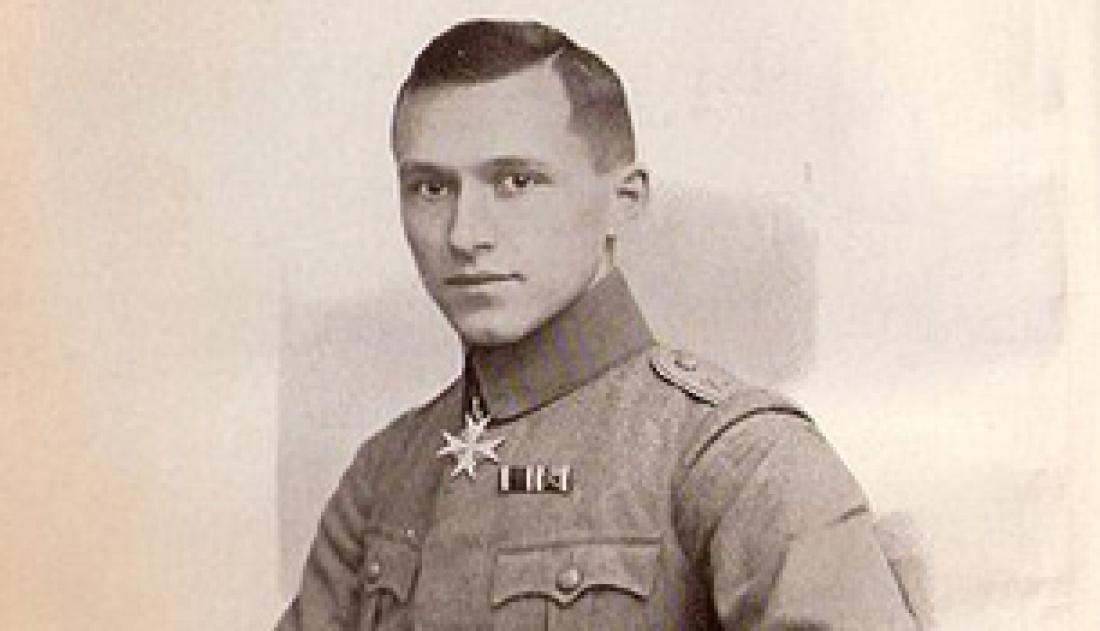
Of the German serviceman writers, French readers will probably only recognise two names: Erich Maria Remarque, the author of All Quiet on the Western Front (1928) and Ernst Jünger, who wrote Storm of Steel (1920). These two works have indeed enjoyed a certain amount of success in France, where they have regularly been republished. The war work of Jünger has even had the honour of appearing in the prestigious Bibliothèque de la Pléiade. In addition, these two authors each represent in their own way the two major political trends of German war literature in the aftermath of the First World War. Although these two works intended to portray a realistic insight into the experiences of soldiers, Jünger's work, written mostly during the conflict, is in a nationalist vein, whilst Remarque was probably the most famous and most symbolic advocate of the German, perhaps even European, pacifist literary vein. As emphasised by Norbert Elias, himself an ex-serviceman of the Great War, this debate on the interpretation of the war - and its translation into literature - was moreover one of the cornerstones of the Weimar republic. For all that, however insightful and important they are, these two names are far from being enough in themselves to account for the artistic and literary proliferation, which emerged in Germany from the experiences of war.
In fact, one of the after effects of mobilisation was the flood of poems that deluged the country. In the first weeks of the conflict, soldiers departing and civilians remaining behind, both professional and amateur writers, composed hundreds of thousands of poems with war as their theme. This poetic tidal wave certainly had its roots in a vibrant German tradition dating back to the "wars of liberation" against the Napoleonic Empire, but its amplitude had been unequalled until then. One of the best scholars of the time, Julius Bab, himself an author and editor of war poetry, estimated that in August 1914 around a million and a half poems were sent in to the papers. Berliner Zeitung alone received around five hundred a day. For Bab, this "poetic mobilisation" was the very proof of the high standard attained by German culture and a fierce denial of all the accusations of barbarity. From the beginning of the war, the contents of these poems was mostly very patriotic, even nationalistic, following the example of Ernst Lissauer's Hate Song Against England (1914) and Heinrich Lersch's A soldier's farewell (...) We are free, Father, we are free! Deep in our hearts, life burns with desire, If we were not free, we could not offer it. We are free, Father, we are free! And didn't you once cry beneath the bullets: Germany must live, even if we must die! (...)
These texts and many others, immediately known across the country, became the "textual icons" of the ongoing war. But such war poetry was far from being the only manifestation of the commitment of writers to the patriotic cause. Although, as in France, the German population in general tended to show more resolution than enthusiasm, on the other hand, the great majority of intellectuals appeared to greet the arrival of a new "Great Era" (Grosse Zeit). This was, of course, the case for the most nationalistic writers as well as for certain young expressionists who saw in the war a demonstration of vitalist and mystical impetus that would overthrow the materialistic and old-fashioned middle class society. This hope, along with the patriotic impetus, explains why many young and not so young writers were to enlist as volunteers during the first few weeks. The very famous Richard Dehmel (51 years old) and Hermann Löns (48 years old) signed up for the army amidst great publicity. They were joined by young writers and artists of the expressionist generation. As in Napoleonic times, the volunteer was to become a leading literary figure.
So, it is fitting that Ernst Wurche, the most famous war story hero at the time, in Walter Flex's The Wanderer between Two Worlds is a young recruit. Incidentally, German literature paid a very heavy price in the war. Hermann Löns was killed in 1914 at Reims, Ernst Stadler in 1914 on the Marne, August Stramm in 1915 on the Eastern Front, Walter Heymann in 1915 near Soissons, Walter Flex in the East in 1917... The expressionist generation was the most affected by the conflict, losing around twenty of its major advocates. Without going so far as to wear a uniform, involvement could also be demonstrated through unfailing jingoistic support of the patriotic cause. Many famous writers therefore signed the famous Call to the civilised world of the ninety-three German intellectuals of October 1914. We find, amongst other signatories of this manifesto refuting accusations of barbarity and atrocities, Richard Dehmel, Gerhart Hauptmann and Hans Thoma. Although not all writers went so far as to get involved in this way, in intellectual circles at the beginning of the war, demonstrations of pacifism and resistance against the spirit of the time remained very rare. We can quote Heinrich Mann who, unlike his brother Thomas, remained untouched by jingoism throughout the conflict.
A few rare avant-garde revues, such as Franz Pfemfert's Die Aktion (Action), also remained true to pacifist principles with a critical view of events. This revue was notably one of the first to publish, in a consistent way, a new kind of poetry: the "poetry of the front" (Frontdichtung). A kind of poetry, which, following the example of the war narrative, was to take on greater and greater importance; it now tried to depict the horrors of modern warfare with no concessions. In fact, over time, we can see, as with the other warring nations, the emergence of a war literature in verse and in prose that comes directly from the experience of its authors. Such accounts multiplied and, as in France, editors put together collections specialising in this type of literature. Poets such as Heinrich Lersch, Max Barthel and Karl Bröger made their names through their poetry from the front. Expressionist poets like August Stramm, Kurt Heynicke, Fritz von Unruh and Paul Zech compared their modern aesthetics with the modernism of the war to produce some absolutely outstanding works, such Kurt Heynicke's Ballad of rolling fire for example:
(...) The night dances. And yet the earth is torn apart in strips of blood. Missiles warble, Birds of death - Oh so many young people dead (...)
Some of these works demonstrate a slow evolution towards pacifism as a result of the awareness of the particular character of a war that was becoming more and more absolute. This is, for example, the case of Fritz von Unruh. Originally from a noble family very close to the Kaiser, he enlisted in 1914. He wrote a few patriotic poems at the beginning of the war. But gradually, influenced by his experiences, his work took an increasingly distinctly pacifist turn. When in 1916 the Kronprinz, whom he knew personally, commissioned him for a description of the battle of Verdun, he responded to the order with an expressionist novel entitled Opfergang (The Way of Sacrifice, translated into French in 1923 under the title Verdun), judged to be "unpublishable" by the military authorities. Indeed, the work would not be published until 1919. Unruh is not a unique case. Probably because the defensive rhetoric that accompanied the war in all the warring countries was the most difficult to sustain in Germany - German soldiers were fighting on foreign soil - literary pacifism emerged in a more aggressive and bigger way than in the opposite camp.
The military writers and poets were not the only ones to play a part in this development. In fact, writers exiled in Switzerland also played a significant role. Switzerland welcomed avant-garde literary revues such as the Alsacien writer René Schickele's Zeit-Echo (The echo of time) and The White Pages (Die Weissen Blätter). He also produced a collection, the European Library, which translated the war novels of Henri Barbusse and Georges Duhamel into German just a few months after their publication in French. In 1916 Zurich would also witness the birth, around the "Cabaret Voltaire" and a group of young German language poets, of the first Dadaist movement, which would spread equally well in both Paris and Berlin in the aftermath of the conflict. On a global scale, however, despite its diversity, pacifist literature remained in a minority throughout the conflict, so much so that the civil and military authorities, who had initially been suspicious of war narratives and poems, became resigned to limiting censorship of them, except where they were explicitly anti-war. As in France, we saw the appearance of accounts of war depicting the conflict in a realistic light, like, for example, the novel The Captain (1916) by Friedrich Loofs, a doctor on the Front, who, whilst remaining fiercely patriotic, did not hesitate to portray the extreme violence of the fighting.
In parallel with this literature, true life accounts from servicemen engaged in modern warfare - notably aviators and sub-mariners - enjoyed great success in print, following the example of the war journal of Manfred von Richthofen, the famous Red Baron. The success in print of war literature was not just limited to this particular type of literature. As in France, the trench warfare and heavy artillery battles recounted by those who had taken part in them, enjoyed great success. Demand for The Wanderer between Two Worlds, mentioned above, exceeded the 200,000 copies sold. After the defeat of 1918, interest in this type of literature declined markedly. However, it never really disappeared. During the first years of the Weimar Republic, literary interpretations of the Great War violently confronted each other. Pacifist literature grew from the roots of the first wartime endeavours, taking advantage of the end of the regime of military censorship to promote a utopian vision of the refound amity between nations and of perpetual peace. However, the nationalist authors, for whom the Great War would not be over until it was won - to use an expression of Ernst von Salomon - would not give up the fight.
So, Ernst Jünger, Franz Schauwecker and Erich Edwin Dwinger published their war stories during the nineteen twenties. Interest in this type of literature, along with the intensity of the polemic, increased once again with the release of the novel All Quiet on the Western Front which, in 1928 opened a second phase of publication of war novels, dominated this time by the fictional genre.
German success, followed quickly on a European and worldwide scale, led to a proliferation of war novels being published at the beginning of the nineteen thirties, such as Ernst Johannsen's Four from the Infantry (1929) and Ludwig Renn's War (1929), for example. But, at the same time, a war literature inspired by nationalism and/or Nazism was also finding its way into print. In terms of quantity, this type even dominated. According to the American scholar Donald Day Richards, pacifist works only accounted for 12% of war novels sold in Germany between 1919 and 1939. It is true that from 1933, "anti-war" literature was banned. The Nazis effectively eliminated it. Once this purging process had been carried out, a certain number of military writers got together in 1936 under the auspices of an association of Nazified military writers called "the team". Its aim was to collect and publish those accounts of war in line with the Nazi vision of the First World War - the same vision of the most famous military writer of 1914-1918, the Führer Adolf Hitler, for whom the Great War was still not over. In fact, for him, it ended in June 1940, following victory over France.
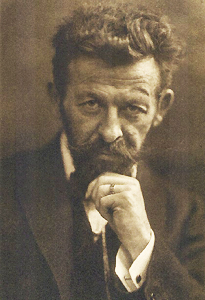
Portrait de Richard Dehmel. Source : Hamburgische Männer und Frauen am Anfang des XX. Jahrhunderts, von Rudolph Dührkoop, Hamburg
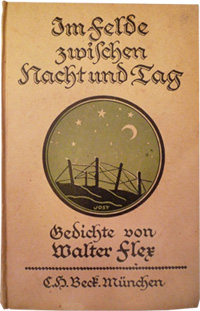
Couverture d'un recueil de poésie de Walter Flex. Source : DR
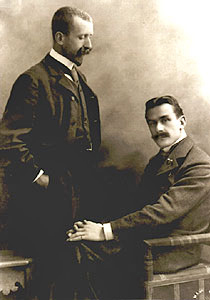
Heinrich et Thomas Mann. Source : Wikimedia Commons, photo libre de droit
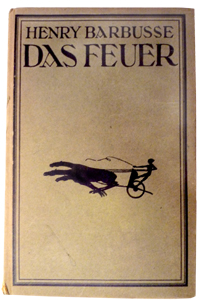
Couverture de la traduction allemande du Feu de Barbusse, parue en 1918 à Zurich. Source : DR
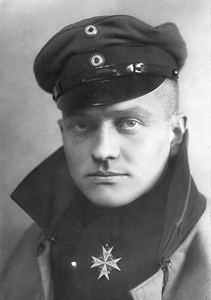
Portrait de Mandred von Richthofen (Baron rouge). Source : English Wikipedia, photo libre de droit
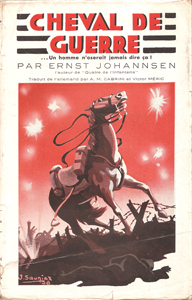
Couverture de la traduction française de Cheval de guerre d'Ernst Johannsen. Source : DR
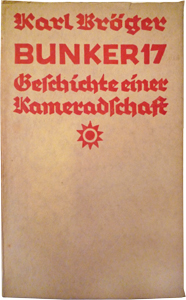
Couverture de Bunker 17
de Karl Bröger, 1929. Source : DR Couverture du roman pacifiste
de Paul Zech paru en 1919. Source : DR
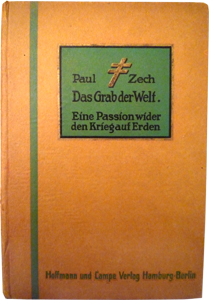
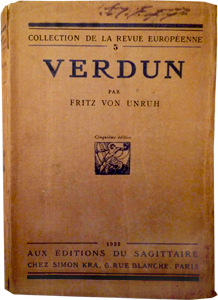
Couverture de la version française de Verdun de Fritz von Unruh. Source : DR
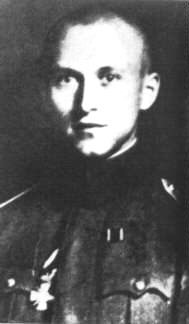
Portrait d'Ernst Jünger. Source : German Wikipedia, photo libre de droit

